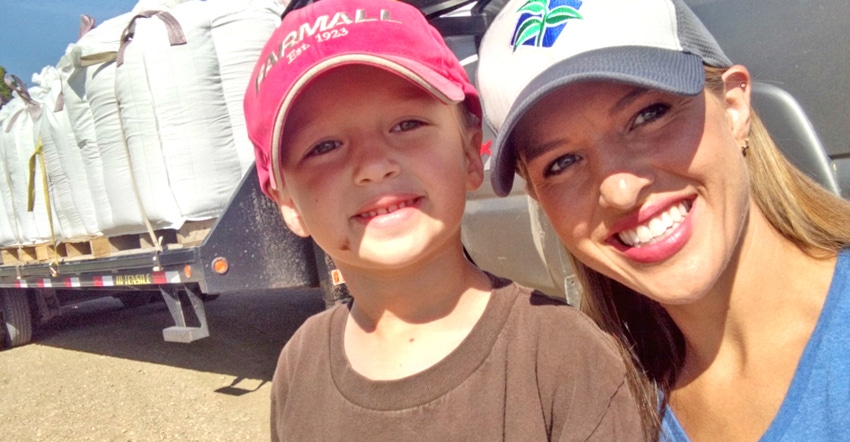December 14, 2017

Ridgeline Farm in Aneta, N.D., has a defibrillator in its shop, and all of the people who work on the farm know how to use it.
“We take farm safety seriously,” says Elizabeth Huso, who operates the diversified grain farm with her husband, Scott, and their partner, Tim Brakke. They have three fulltime and seven seasonal employees.
Both Scott and Elizabeth are emergency medical technicians and serve on the local volunteer ambulance crew.
“We were talking to businesses about putting in defibrillators and we thought that our farm should have one, too,” Elizabeth says.
They haven’t had to use the defibrillator yet, but the medical device is a sign that Ridgeline Farm has taken safety to a new level.
Safety officer
Elizabeth is the farm’s safety officer. The farm also has a four-person safety committee. At the farm’s meetings each Monday morning, Elizabeth leads a short discussion about safety.
Usually they look at what jobs everyone is going to be doing during the week and what hazards they may encounter.
Sometimes, she’ll bring news report about a farm accident and they discuss what happened and why.
“We focus a lot on vehicle safety,” she says. “With so many semis and big equipment on the road, an accident is our No. 1 concern.�”
During every meeting, she works in the Ridgeline Farm safety theme, the four T’s: Take Time To Think.
“We want safety to be on the top of everyone’s mind, especially planting and harvesting when they are really busy,” Elizabeth says. “We want them to slow down and take time to think before they do anything.”
Elizabeth is also in charge of safety inspections. She visits bin and building sites and checks equipment, noting things that have to repaired or changed. She also stocks safety supplies — ear plugs, glasses, gloves and fire extinguishers (they are in every vehicle, tractor and combine).
Everyone is more engaged in safety since Elizabeth started leading safety meetings, Scott says.
“They aren’t just listening to safety reminders, but they are making suggestions.”
As a group, they identified some key hazards in the shop — lifting engines and tires, for example. The farm purchased an engine hoist and wheel trolley to make those jobs easier. They also developed a locked out/tag system to identify equipment that is down for maintenance so that it isn’t used by an employee who is unaware that it needs to be repaired.
Rate discounts
Elizabeth handles all the safety paperwork for the farm, including the reports and audits required by North Dakota Workforce Safety and Insurance. WSI offers several programs to help employers improve worker safety. Employers can receive as much as a 25% discount on their worker compensation premium by participating. WSI even cost shares on equipment — such as the wheel trolley and engine hoist — that the farm invests in to improve safety. The equipment has to qualify under WSI’s Ergonomic Initiative for the discount. An ergonomics specialist from Altru Health Systems in Grand Forks, N.D., had to visit the farm and review the situation. The amount of the cost share depends on the amount the farm pays in workers compensation premiums.
“It can be a significant savings,” Elizabeth says, “and it helps us do all we can to have a safe environment for our employees.”
Learn more at WSI’s website.
You May Also Like




